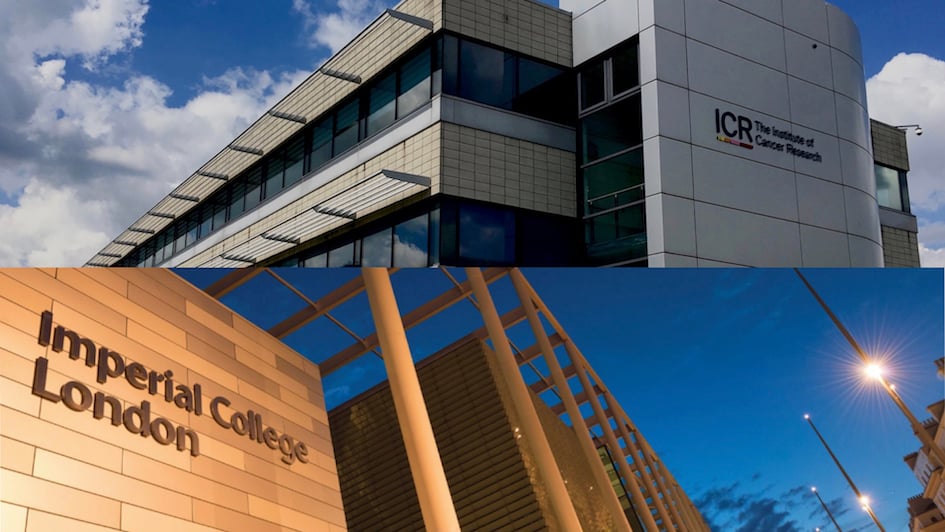Cancer Epidemiology and Prevention Research Unit
The Cancer Epidemiology and Prevention Research Unit (CEPRU) is a joint initiative between The Institute of Cancer Research, London, and Imperial College London.

Image: Split image of Sir Richard Doll building at the ICR in Sutton and Imperial College London building in South Kensington
CEPRU’s vision is to be a global leader in advancing research to understand the cancer continuum, from its causes to clinical outcomes and translate this knowledge into effective strategies for cancer prevention, early detection and survival that will impact clinical practice and public health policy.
Our understanding of the causes and mechanisms of cancer development, and particularly the role of modifiable risk factors, has progressed substantially in recent decades. In addition, genome-wide association studies (GWAS) have identified hundreds of common susceptibly loci for multiple cancers. We have also seen decreases in cancer mortality for a range of cancers thanks to advances in early detection and treatments.
This increased understanding has led to important advances in the prevention of some cancers, both by identifying individuals who are more likely to develop different types of cancers and by reducing human exposure to known carcinogens such as tobacco smoke, some viral infections, and certain environmental and occupational chemicals. However, for many cancers and some well-established risk factors, such as obesity, we have seen only limited translation into effective prevention strategies. In addition, we face the challenge of not knowing what other factors may cause the remaining cancers. This is particularly important for aggressive cancers or those occurring at early ages. Innovative, trans-disciplinary research to characterize exposures and their biological effects through molecular and imaging technologies is needed to uncover novel causes of cancer. Furthermore, the increasing population of cancer survivors, due to improvements in treatments, highlights the need to study late-effects of treatment and the impact of lifestyle changes on prognosis to improve the lives and outcomes for people living with cancer.
CEPRU brings together the complementary strengths and expertise of teams from across Imperial's School of Public Health (SPH) and the ICR’s Division of Genetics and Epidemiology needed to address these challenges. This includes expertise in core areas of cancer epidemiology, exposomics, biostatistics, data science, population health as well as cancer genetics, molecular and digital pathology, mechanisms of carcinogenicity and clinical oncology. Large-scale research resources such as prospective cohorts, case-control studies, clinical studies, real-word data and small area statistics managed by Imperial and the ICR form the basis for population-based research at CEPRU.
Our strategy is to be a catalyst for novel research collaborations between our members and with a wide international network of collaborators and partners, leveraging existing resources to create a multidisciplinary research cluster with the critical mass and breadth of expertise to develop innovative approaches to tackle some of today’s most complex priority challenges in cancer aetiology, prevention, and prognostic research.
CEPRU was founded in November 2020 and led by Professor Elio Riboli until February 2023, when Professor Marc Gunter and Professor Montserrat Garcia-Closas were appointed as CEPRU co-Directors at Imperial and the ICR (respectively). Professor Amy Berrington (ICR) and Dr Alicia Heath (Imperial) were also appointed as part of the CEPRU leadership.
Further details on CEPRU’s membership and research activities will be posted in due course.
